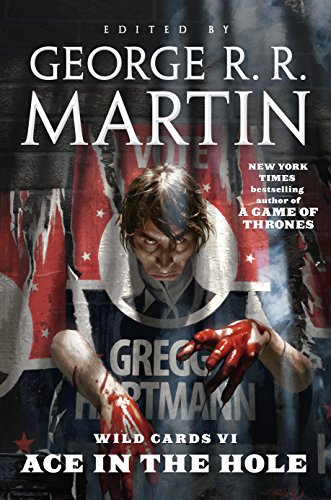
![]() Ace in the Hole edited by George R.R. Martin
Ace in the Hole edited by George R.R. Martin
Ace in the Hole (1990), the sixth WILD CARDS mosaic novel, is a vast improvement over the last two novels (Aces Abroad and Down and Dirty). Down and Dirty, especially, lacked cohesion due to George R.R. Martin’s lack of editorial control over his authors, something he laments in that book’s afterword. I suspect the experience was a good lesson because he’s fixed the issue in Ace in the Hole. You’d never know the story was written by several different authors (Walter Jon Williams, Victor Milán, Melinda M. Snodgrass, Stephen Leigh, Walton Simons). It has an exciting, focused plot which flows smoothly and significantly advances the overall WILD CARDS story.
Ace in the Hole takes place at the 1988 Democratic National Convention in Atlanta. The real historical figures are there — Michael Dukakis, Jesse Jackson, Dick Gephardt, Gary Hart, Al Gore, and others. With the exception of Jesse Jackson, we see very little of them in Ace in the Hole because in this historical fantasy there are also two WILD CARDS characters running for president. One is Senator Gregg Hartmann (written by Stephen Leigh), an attractive charismatic man who is running on a platform of civil rights for jokers. Gregg seems like a wonderful person, but what people don’t know is that Senator Hartmann is a secret Ace. His body is host to a powerful manipulative force he calls “Puppetman.” Whenever he shakes anyone’s hand, the person becomes one of Gregg’s puppets who he can manipulate to his will. The trade-off for this ability, though, is that Puppetman feeds on the negative emotions of Gregg’s puppets and has a compulsion to torture and kill. Gregg must occasionally give in to the compulsion or Puppetman will ascend and ruin Gregg’s marriage and career.
 The only person who knows the truth about the Senator is Sara Morgenstern (written by Victor Milan), a Washington Post reporter who wants to expose Gregg as a sadistic murderer before he gets nominated for president. Gregg is determined to stop her and anyone else who gets in his way. His dirty work is done by the scariest WILD CARDS character we’ve met so far: Mackie (“Mack the Knife”) Messer (also written by Milan), a sociopathic German Ace who can walk through walls and make his hands turn into chainsaws.
The only person who knows the truth about the Senator is Sara Morgenstern (written by Victor Milan), a Washington Post reporter who wants to expose Gregg as a sadistic murderer before he gets nominated for president. Gregg is determined to stop her and anyone else who gets in his way. His dirty work is done by the scariest WILD CARDS character we’ve met so far: Mackie (“Mack the Knife”) Messer (also written by Milan), a sociopathic German Ace who can walk through walls and make his hands turn into chainsaws.
It seems obvious that Senator Hartmann should be stopped from winning the nomination, right? … Not so fast… His main rival is the Reverend Leo Barnett, a man who fears Jokers and the moral decay he says they will bring about, and wants to protect society by removing them. If he gets elected, Jokers will likely be rounded up and banished to Joker ghettos or concentration camps. Leo Barnett will be acting on his principles, but his intolerance and xenophobia will cause Jokers to suffer as they do in other parts of the world.
Caught up in all the drama — and there’s a lot of it in Ace in the Hole — are several other recurring WILD CARDS characters — Dr. Tachyon and his grandson Blaise (written by Melinda Snodgrass), Jack “Golden Boy” Braun (written by Walter Jon Williams), James “Demise” Spector (written by Walter Simons). We also get to see other real historical figures such as several reporters from the late ‘80s that I remember fondly: Connie Chung, Jane Pauley, Peter Jennings, and Ted Koppel.
 The story is exciting as the politicians try to out-maneuver each other, Gregg tries to cover up his past affair with Sarah while controlling Puppetman, there are multiple assassination attempts, a couple of well-established characters die, and Mackie leaves a bloody trail wherever he goes. Scenes starring Demise tend to feature a wonderful black humor. There’s drama, horror, and comedy in this installment. The final climactic scene is spectacular.
The story is exciting as the politicians try to out-maneuver each other, Gregg tries to cover up his past affair with Sarah while controlling Puppetman, there are multiple assassination attempts, a couple of well-established characters die, and Mackie leaves a bloody trail wherever he goes. Scenes starring Demise tend to feature a wonderful black humor. There’s drama, horror, and comedy in this installment. The final climactic scene is spectacular.
What’s really striking about reading a book set during the 1988 Democratic Convention (published in 1990) was noticing how little politics has changed since that time. All of the schmoozing, lobbying, propaganda, rumors about improper conduct, even suspicions of the Russians interfering with the election! Politics is the same as it ever was. So are the media.
As usual, I listened to the audiobook version of Ace in the Hole. It’s 15.25 hours long, produced by Random House Audio, and read by several narrators including Will Estes, Clancy Brown, Stephen McHattie, Raphael Sbarge, P.J. Ochlan, and Emily Rankin. They all do a great job, especially the narrator who reads Mackie’s perspective (I don’t know which one it is, unfortunately). As I’ve mentioned before with the previous volumes, I am not crazy about multiple narrators for a novel because each character has a different voice when they speak during another character’s perspective. I find that a little annoying and sometimes even confusing. In my opinion, multiple narrators only works for anthologies. But still, I don’t hesitate to recommend this audiobook. It’s a great way to read WILD CARDS. I’m looking forward to the next installment, Dead Man’s Hand which comes out on June 13, 2017.



If the audiobook producers went to the trouble of hiring different narrators, I wonder why they didn’t just go with a full-cast recording, so that the character voices were the same for every story. That seems like the best way to avoid confusing the listener or weird-sounding characters.
It’s really hard to do full-cast recording because then, I think, the whole cast has to be together to record it. The only company I know of that does it (Full Cast Audio) was created by Bruce Coville to make recordings of children’s books that families could listen to together. According to their website, they only choose books that have lots of dialogue because “otherwise, why record it with a full cast?”
The way multiple narrators are usually done is that each narrator records their own chapters (a particular character’s viewpoint) probably each in their own recording studios, and then they compile it. It would be costly and impractical to get them all together in the same studio and, for a book without tons of dialogue, not all that helpful.
Frankly, I find full cast a little weird, too, because the narrator is telling us the story and then the story feels interrupted when a different actor jumps in to say a line of dialogue. It loses its flow. As Coville said, the book needs to be heavy on dialogue and light on narration to make it work. I have read several of the FCA books and they’re quite good, but they feel like family productions, not how you want to read an adult book.